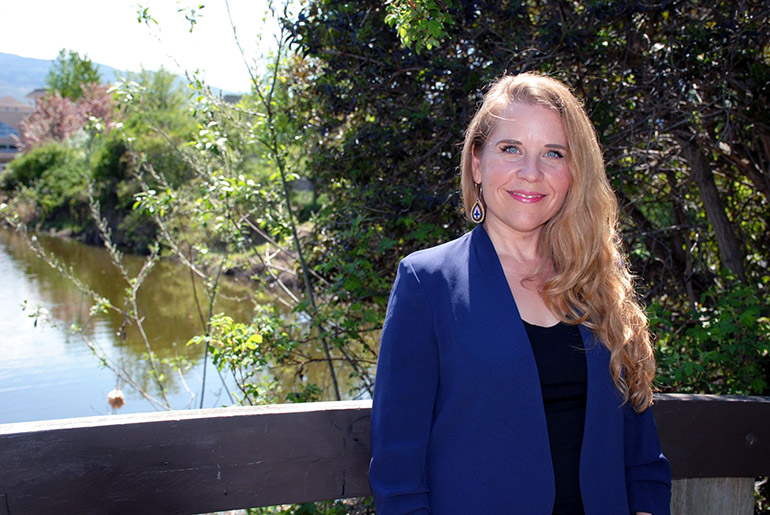
Katrina Plamondon, assistant professor in UBC Okanagan's School of Nursing.
The COVID-19 outbreak creates a clear image of unbalanced, unfair societies
A UBC researcher says the COVID-19 outbreak provides a distinct example of how different populations are differentially affected by health issues.
Katrina Plamondon, an assistant professor in UBC Okanagan's School of Nursing, studies and looks for ways to support global health equity. Achieving health equity, she says, is about creating a world where regardless of where a person is born or lives, all people can reach their full potential.
"Health equity is something to strive for, it's an aspiration," she explains. "In a world of health equity, life trajectories aren't determined by race, class, education or other unearned social disadvantages."
Today, as the world struggles through COVID-19, it's clear that at local, regional, and national levels, the world still has a long way to toward health equity, says Plamondon.
"Health is shaped by all sorts of social determinants, and different populations navigate and are affected by these determinants in different ways," Plamondon says. "When societies are more inequitable, different populations or communities do not enjoy the same benefits as others."
For example, Plamondon says the life expectancy of people living "rough" or without housing can be half of those who live in houses, have secure employment and education.
"In Canada, people living rough have a life expectancy of about 40," she says. "This is a huge difference and it's not by accident. It's not because people living rough are biologically dispositioned to a lower life expectancy or aren't as deserving-there are lots of systemic reasons why someone's life trajectory lands there."
And the COVID-19 outbreak offers another window into understanding how different populations are differentially affected by health issues. People working in jobs with poor benefits and protections face significantly different challenges in responding to public health advice-a circumstance that could be mitigated by social policies that protect job security and income if people need to be away from work. While the Canadian government has invested millions to help individuals, landlords and companies during COVID-19, many countries simply cannot afford to do so.
Populations already known to experience the greatest inequities are also experiencing the greatest impacts of the pandemic, she says. Racialized populations in the United States, displaced peoples, including climate refugees, those living in rural or remote communities, or people coping with housing insecurity, among others, were already facing inequities in access to healthcare and, in many cases, to basic human rights.
"At a time when the health of everyone affects everyone else, these inequities in access to care are a powerful demonstration of why equity matters to everyone."
Plamondon says advancing health equity is complex, difficult and worth doing. While many people are aware of unfair differences in health across societies, Plamondon says the tendency is to pay attention to symptoms of inequities, rather than the causes. Governments, researchers and health professionals can pay a lot of attention to people with poor health, saying it is their individual responsibility to remain healthy.
Plamondon's research has a focus on advancing health equity and she has written extensively on Canada's role in global health research. One study, published in the International Journal for Equity in Health, identified a set of tools that can be used to guide actions to achieve health equity. "Our research shines a light on what can we do differently as we make decisions that influence people and their opportunities for health," she says. "To the best of our knowledge, this is the first review to critically examine promising and empirically-derived strategies for advancing productive action on the root causes of health inequities."
Based on this review, some things that can advance health equity are:
- Creating systems that acknowledge the importance of health equity in their policies and commit to identifying equity impacts of their decisions and bureaucratic structures
- Work with others, with particular attention to inclusion
- Take time to examine relationships between policies, actions, and equity outcomes
- Actively mitigate power imbalances (e.g., amplifying voices of historically excluded groups)
- Work with data in ways that show the health outcomes by different-and intersecting-social positions (e.g., consider both Indigeneity and gender in analysis, rather than gender alone)
- Tell the human story behind data, evoke compassion
- Offer feasible policy options alongside research results, offering policymakers starting points for making evidence and equity-informed decisions
About UBC's Okanagan campus
UBC's Okanagan campus is an innovative hub for research and learning founded in 2005 in partnership with local Indigenous peoples, the Syilx Okanagan Nation, in whose territory the campus resides. As part of UBC-ranked among the world's top 20 public universities-the Okanagan campus combines a globally recognized UBC education with a tight-knit and entrepreneurial community that welcomes students and faculty from around the world in British Columbia's stunning Okanagan Valley.






